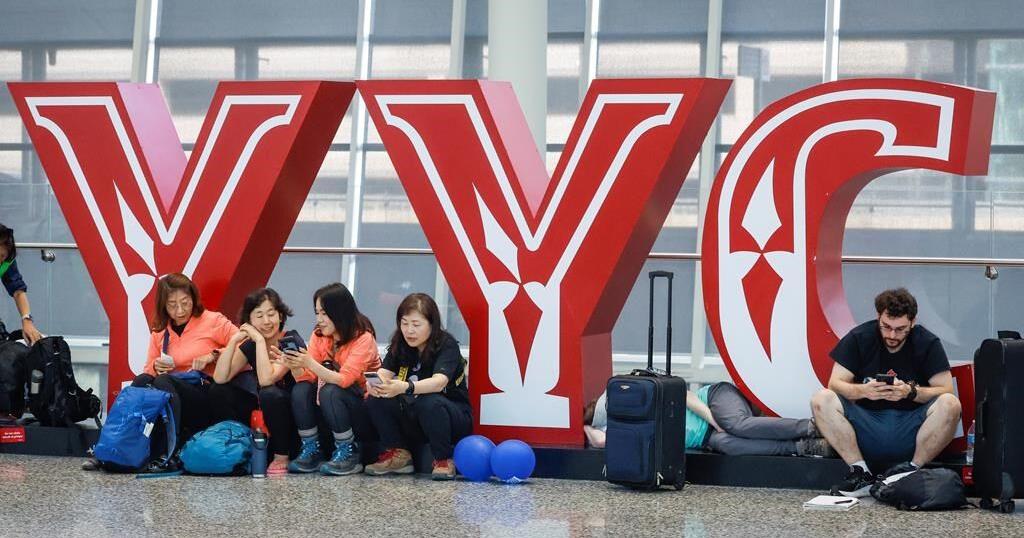WestJet has reached a deal with its mechanics to end a strike that had disrupted the travel plans of tens of thousands of travellers over the Canada Day long weekend.
In a news release on its website, WestJet said there will still be flight disruptions in the week ahead as its planes are brought back into service.
“The damage to Canadians and our airline is massive, a swift resolution was necessary; we take no victory laps on this outcome but will sleep better tonight knowing further harm has been prevented,” airline president Diederik Pen said in the release, which was posted late Sunday.
In its own news release, the Airplane Mechanics Fraternal Association urged its members to return to work immediately pending a vote on the temporary agreement.
“We believe this outcome would not have been possible without the strike, but we do regret the disruption and inconvenience it has caused the travelling public over the Canada Day holiday period,” the union said in its statement.
“We are pleased the strike lasted only 48 hours and that service can now return to normal.
Some 680 workers, whose daily inspections and repairs are essential to airline operations, had walked off the job on Friday evening despite a directive for binding arbitration from the labour minister.
Since Thursday, WestJet had cancelled 829 flights scheduled between then and Monday — the busiest travel weekend of the season — the carrier said.
The vast majority of Sunday’s trips were called off as WestJet pared down its 180-plane fleet to 32 active aircraft and topped the global list for cancellations among major airlines over the weekend.
Trevor Temple-Murray was one of thousands of customers scrambling to rebook after their trips were scrapped less than a day in advance.
“We’ll just have to wait it out,” said the resident of Lethbridge, Alta., who was on hold in the parking lot of the Victoria airport trying to get a plane to Calgary, his wife and two-year-old son beside him in the car.
Their 6:05 p.m. flight had been cancelled, and they wouldn’t know until the evening whether a scheduled 7 a.m. flight the next day would go ahead.
“There are a lot of angry people in there,” Temple-Murray said, pointing at the terminal.
Nearby, Grade 10 exchange student Marina Cebrian said she was supposed to be back home in Spain early Sunday, but now won’t return to her family until Tuesday after enduring three flight cancellations.
“It’s distressing,” she said. “I was supposed to be at home today, like seven hours ago, but I’m not.”
Both WestJet and the union had accused the other side of refusing to negotiate in good faith.
The airline’s president had stressed what he called the “continued reckless actions” of a union making “blatant efforts” to disrupt Canadians’ travel plans, while the association claimed the Calgary-based company had refused to respond to a counterproposal. In an update to members Sunday, it said mechanics were “the victim of WestJet’s virulent PR campaign that you are scofflaws,” citing “calumnies” against workers around their right to strike.
This is the second tentative agreement in the dispute.
Union members voted overwhelmingly to reject a tentative deal from WestJet in mid-June and following two weeks of tense talks between the two parties.
“We will see no further labour action coming out of this dispute, as both parties agree to arbitrate the contract in the case of a failed ratification,” Pen said in the news release announcing the deal.
As the clock ticked down toward a Friday strike deadline, the impasse prompted Labour Minister Seamus O’Regan to step in, mandating that the airline and union undertake binding arbitration headed by the country’s labour tribunal.
That process typically sidesteps a work stoppage. WestJet clearly thought so, stating the union had “confirmed they will abide by the direction.”
“Given this, a strike or lockout will not occur, and the airline will no longer proceed in cancelling flights,” the airline said Thursday.
The mechanics took a different view. The union negotiating committee said it would “comply with the minister’s order and directs its members to refrain from any unlawful job action.” Less than 24 hours later, workers were on the picket lines.
A decision from the Canada Industrial Relations Board seemed to affirm the legality of their actions regardless of protocols around arbitration.
O’Regan said the next day the board’s ruling was “clearly inconsistent” with the direction he provided, but later added he respected the body’s independence. He met with both sides Saturday evening.
In a submission to the tribunal last week, WestJet lawyers said the union sought “an unreasonable and extortionate outcome” and intentionally manoeuvred to place the strike date at the height of summer travel.
The union said its demands around wages would cost WestJet less than $8 million beyond what the company has offered for the first year of the collective agreement — the first contract between the two sides. It has acknowledged the gains would surpass compensation for industry colleagues across Canada and sit more on par with U.S. counterparts.
WestJet said it has offered a 12.5 per cent wage hike in the first year of the contract, and a compounded wage increase of 23 per cent over the rest of the five-and-a-half-year term.
This report by The Canadian Press was first published July 1, 2024.

























